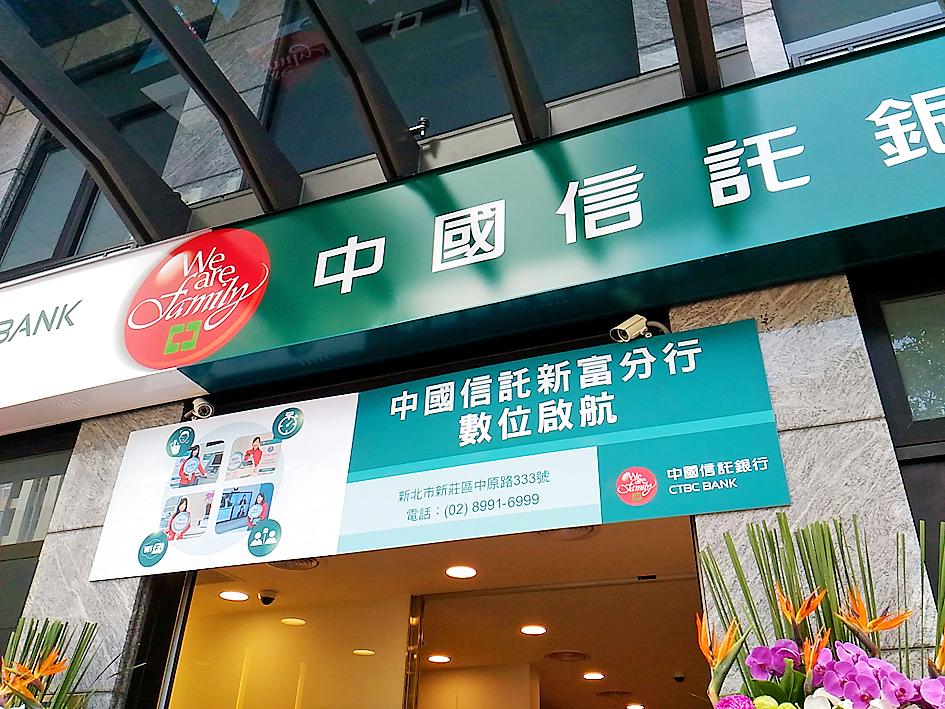With a brand value of US$1.382 billion, CTBC Bank (中國信託銀行) was named the most valuable banking brand in Taiwan for the seventh time last year, and the world’s 153rd-most valuable brand, according to a report on the world’s 500 biggest banking brands released by Brand Finance and The Banker magazine.
The bank’s brand value has increased by more than 40 percent in the past three years, more than any other bank in Taiwan and outpacing the industry in Asia. The authors of the report named CTBC Bank the Taiwanese market’s leader.
Brand Finance, a brand research institution founded in the UK in 1996, values more than 5,000 brands from around the world and announces the 500 most valuable corporate brands every year.

Photo: Lee Chin-hui, Taipei Times
The report used quantitative financial analysis and qualitative aspect evaluation to devise the organization’s brand strength index, brand loyalty rate and forecast revenues. Through these, it calculated the brand value of institutions to compile the global 500 list.
The authors estimated that, due to the COVID-19 pandemic, two-thirds of the world’s 500 biggest banks lost value last year.
Despite this, CTBC Bank moved up 21 positions in the ranking, and its brand value continues to increase. With an “A+” credit ranking, CTBC Bank is now Taiwan’s highest-valued banking brand.
According to Brand Finance, CTBC Bank has played an important role in assisting the public in dealing with the effects of the pandemic, with digital financial technologies accelerating the review process of applications for relief funds by more than 280,000 workers, placing CTBC above the pack in indicators such as consumer satisfaction and corporate social responsibility.
The bank has performed well in a range of indicators in the survey. In addition to business performance, it also leads other Taiwanese banks in areas such as employee recognition and community investment, showing how CTBC not only pursues performance growth, but also uses its corporate soft power to coalesce its employees’ identification with the brand and the company.
The bank has also long worked in five areas of public interest — charities, anti-drug initiatives, sports, education and the arts — showing its proactive commitment to financial inclusion and social sustainable development to implement its “we are family” brand spirit and “protect and build” corporate mission.

NEW IDENTITY: Known for its software, India has expanded into hardware, with its semiconductor industry growing from US$38bn in 2023 to US$45bn to US$50bn India on Saturday inaugurated its first semiconductor assembly and test facility, a milestone in the government’s push to reduce dependence on foreign chipmakers and stake a claim in a sector dominated by China. Indian Prime Minister Narendra Modi opened US firm Micron Technology Inc’s semiconductor assembly, test and packaging unit in his home state of Gujarat, hailing the “dawn of a new era” for India’s technology ambitions. “When young Indians look back in the future, they will see this decade as the turning point in our tech future,” Modi told the event, which was broadcast on his YouTube channel. The plant would convert

‘SEISMIC SHIFT’: The researcher forecast there would be about 1.1 billion mobile shipments this year, down from 1.26 billion the prior year and erasing years of gains The global smartphone market is expected to contract 12.9 percent this year due to the unprecedented memorychip shortage, marking “a crisis like no other,” researcher International Data Corp (IDC) said. The new forecast, a dramatic revision down from earlier estimates, gives the latest accounting of the ongoing memory crunch that is affecting every corner of the electronics industry. The demand for advanced memory to power artificial intelligence (AI) tasks has drained global supply until well into next year and jeopardizes the business model of many smartphone makers. IDC forecast about 1.1 billion mobile shipments this year, down from 1.26 billion the prior

People stand in a Pokemon store in Tokyo on Thursday. One of the world highest-grossing franchises is celebrated its 30th anniversary yesterday.

Zimbabwe’s ban on raw lithium exports is forcing Chinese miners to rethink their strategy, speeding up plans to process the metal locally instead of shipping it to China’s vast rechargeable battery industry. The country is Africa’s largest lithium producer and has one of the world’s largest reserves, according to the US Geological Survey (USGS). Zimbabwe already banned the export of lithium ore in 2022 and last year announced it would halt exports of lithium concentrates from January next year. However, on Wednesday it imposed the ban with immediate effect, leaving unclear what the lithium mining sector would do in the